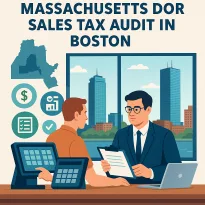IRS Tax Resolution Services in Quincy, MA: Local CPA Guidance from a Neighbor Who Knows the South Shore
Quincy, Massachusetts — “The City of Presidents” — is more than just a historic landmark. It’s a thriving South Shore community where families, professionals, and small businesses work hard every day. From the waterfront near Marina Bay to the bustling shops around Quincy Center, residents here take pride in their roots. As someone who lived in Quincy for years, I know firsthand the character of this city — its resilience, its community spirit, and its challenges. And I also know that when an IRS letter arrives, even the strongest business owner or retiree can feel overwhelmed. That’s where IRS tax resolution services in Quincy, MA and the steady hand of a trusted CPA in Quincy, MA come in.
Why Quincy Residents Face IRS Notices
Quincy is home to a wide range of taxpayers — from small family restaurants along Hancock Street to professionals commuting to Boston, to retirees who’ve spent decades saving for their golden years. Common IRS triggers in Quincy include:
- Small businesses: Family-run restaurants, retail shops, and contractors often face payroll or 1099 reporting issues.
- Real estate sales: With rising home values in areas like Wollaston and Squantum, capital gains reporting often sparks IRS letters.
- Retirees: Many longtime Quincy residents balance pensions, Social Security, and IRA withdrawals, creating opportunities for duplicate or misreported income.
- Commuters & professionals: Those working in Boston often juggle W-2s, side income, and even equity compensation, leading to mismatches.
- International ties: With Quincy’s diverse community, foreign accounts and overseas income sometimes go unreported properly, triggering IRS scrutiny.
Case Story: The Quincy Restaurant Owner Who Faced a $180,000 Payroll Tax Bill
Several years ago, I was contacted by a restaurant owner near Quincy Center. He and his family had run the business for decades, serving locals who came in after Red Line commutes and before strolls along Wollaston Beach. One morning, he received a devastating IRS notice claiming more than $180,000 in unpaid payroll taxes. The letter warned of bank levies, property liens, and even potential passport restrictions. For a man who had poured his life into feeding the community, the shock was almost unbearable.
The first thing I did was pull IRS transcripts. What we found was that several payments had been misapplied, credited to the wrong quarters. Other deposits were missing altogether in the IRS system, despite the restaurant having proof of payment. To the IRS, it looked like deliberate noncompliance. In reality, it was poor processing and clerical error.
I worked side by side with the family to gather payroll records, bank statements, and deposit slips. We built a comprehensive package for the IRS, showing clearly that the business had been making good faith efforts to comply. Over several months, I negotiated directly with IRS agents. There were tense moments — the IRS at one point threatened immediate levy action — but I filed appeals and requested collection holds to buy us time. Step by step, we made progress.
In the end, the IRS agreed to reduce the liability by more than 60%, acknowledging the misapplied payments. The remainder was placed on an installment agreement tailored to the restaurant’s cash flow. The business survived, the employees kept their jobs, and the owner regained his peace of mind. More importantly, the community kept its beloved neighborhood restaurant — a reminder that behind every tax case is a family and a story worth saving.
The Audit Experience in Quincy
Audits for Quincy taxpayers can happen in several forms:
- Correspondence audits: Most common, handled by mail for smaller mismatches like 1099s.
- Office audits: Typically scheduled at the Boston IRS office, a short Red Line ride from Quincy Center.
- Field audits: IRS agents may visit your home or business — something that can feel especially invasive for small business owners along the South Shore.
In all cases, representation is key. A CPA in Quincy, MA can attend meetings, prepare documents, and keep you from facing the IRS alone.
The Audit Experience in Quincy: What South Shore Small Businesses Face
For small business owners in Quincy—whether you run a seafood bistro near Marina Bay, operate a landscaping service off Hancock Street, or manage a tech consultancy near Quincy Center—the mere thought of an IRS audit can cause sleepless nights. Unlike big-city firms, South Shore entrepreneurs often lack teams of tax professionals to respond on the spot. When an audit notice arrives, confusion and stress follow quickly.
Which IRS Office Handles Quincy’s Audits?
Although Quincy doesn’t host its own IRS Taxpayer Assistance Center, support is available just a short drive down the Red Line. The closest in-person IRS office is located at 15 New Sudbury Street in Boston (John F. Kennedy Federal Building)
When Massachusetts DOR Gets Involved
On the state level, Quincy businesses may also interact with the Massachusetts Department of Revenue or local agencies. The state’s Taxpayer Service Division in Boston handles income and sales tax issues, while the Quincy Assessors’ Office addresses property and excise matters.
Common Audit Triggers for Quincy’s Small Businesses
From local forums and business gatherings, I’ve heard the same issues repeatedly: missing payroll tax deposits, unfiled sales tax returns, 1099 mishaps, and unorganized bookkeeping. For example:
- **Payroll tax misapplications** – Sometimes payments go uncredited or get assigned to the wrong quarter, especially if auto-drafts or manual transfers weren’t logged clearly.
- **Sales tax reporting errors** – Retailers and restaurants often neglect to file or report partial exemptions correctly, triggering state DOR audits.
- **1099 confusion** – Contractors forget to issue 1099s, or clients report duplicate payments to the IRS.
- **Digital bookkeeping gaps** – QuickBooks sync glitches or unsynced mobile sales apps complicate record reconciliation, leaving gaps that auditors flag.
These issues are particularly acute for businesses headquartered around Quincy’s transit hubs, where owners juggle commuting and operations across Boston and the South Shore.
What a Quincy Audit Feels Like—Firsthand
Let me paint a typical scene I’ve encountered: A local café owner received an IRS correspondence audit requesting three years of payroll records. The documents weren’t well organized—ledgers mixed with receipt envelopes, no clear deposit tracking. With inconsistent records, the IRS proposed a tax adjustment, and the owner feared levy notices or payroll disruption.
I stepped in, acting as the official representative. First, I pulled IRS transcripts to see what the IRS saw. That’s always step one. It revealed that only part of the payroll deposits were credited. The rest looked unpaid—even though the owner had bank entries and deposit slips as proof.
Next, I created a clean, well-organized response packet: payroll journals, reconciled bank statements, and deposit records clearly tied to tax periods. I scheduled a meeting in Boston at the IRS office to present the documentation in person. It’s stressful—but for Quincy business owners, that short Red Line ride beats paperwork passing back and forth.
How Resolution Unfolded
The IRS initially maintained a partial assessment. But when I presented side-by-side reconciliations and proof-of-payment visuals, they retracted — crediting nearly all misplaced payments. In the end, proposed penalties were removed, and only a modest balance remained. That was placed on a manageable installment agreement, protecting the business from levies or liens.
Meanwhile, I advised the owner to connect with Quincy’s Assessors’ Office for property tax clarity and explored whether any excise exemptions applied to their facility or equipment :contentReference[oaicite:7]{index=7}. :contentReference[oaicite:8]{index=8} :contentReference[oaicite:9]{index=9}.
Key Takeaways for Quincy Business Owners
- **Pull IRS transcripts early:** It reveals misapplied or missing payments—a common small-business issue on the South Shore.
- **Get organized:** Bank statements, deposit slips, and payroll schedules must align clearly.
- **Local support matters:** You can meet in person at the Boston IRS office, and Quincy’s south-of-Boston proximity gives you an advantage for quick access.
- **Use city/state resources:** The Quincy Assessors’ Office handles property tax concerns, while Mass DOR provides hearing and abatement avenues.
- **Understand the audit path:** Most are correspondence audits. But prepare for office visits—and I’ll be by your side.
In Quincy, MA, small businesses need more than just tax tools—they need a neighbor with local understanding. I’ve walked Quincy’s streets, shared its sunrise waterfronts, and rooted for small business dreams in our shared community. When IRS issues arise, your CPA should be someone who truly knows Quincy — its challenges, its rhythms, and its resilience.
“`
Resolution Options for Quincy Taxpayers
Residents and business owners in Quincy have several ways to resolve tax issues:
- Installment agreements: Break payments into manageable amounts.
- Offer in Compromise: Settle for less than the full amount if you qualify.
- Penalty abatement: Remove penalties for reasonable cause or first-time mistakes.
- Currently Not Collectible status: Temporarily halt IRS collection actions if paying would cause hardship.
- Audit reconsideration: Revisit prior audit decisions when new evidence comes to light.
Bringing It Home: Why Local Matters
Quincy isn’t just another city on a map — it’s a place where neighbors know each other. From Marina Bay sunsets to afternoons at Adams National Historical Park, Quincy carries both history and heart. Having lived here myself, I understand the culture, the pace, and the pride. When the IRS sends a letter, you don’t need a call center in another state. You need a CPA in Quincy, MA who knows the South Shore, who can sit across the table from you, and who treats your case with the personal care it deserves.
FAQs for Quincy, MA Taxpayers
Quincy IRS Tax Resolution — FAQs
Yes. Family-run businesses in Quincy — from local diners to construction firms — often struggle with payroll tax deposits. IRS tax resolution services in Quincy, MA help identify misapplied payments and negotiate with the IRS.
Reference: IRS Publication 15 (Employer’s Tax Guide)
It can. Rising property values in Wollaston and Squantum mean large gains, and if depreciation or basis isn’t reported correctly, the IRS may issue a notice. A CPA in Quincy, MA ensures your real estate sales are fully compliant.
Reference: IRS Publication 523 (Selling Your Home)
Many Quincy residents earn W-2 income in Boston but also have side businesses or gig work. This combination often results in mismatched 1099s. IRS tax resolution services in Quincy, MA resolve these mismatches efficiently.
Reference: IRS — About Form 1099-NEC
Yes. Retirees balancing pensions, IRAs, and Social Security often receive duplicate or misreported 1099s. A CPA in Quincy, MA protects retirement income from incorrect IRS assessments.
Reference: IRS Publication 525 (Taxable and Nontaxable Income)
Yes. Wage garnishment is a common enforcement tool. IRS tax resolution services in Quincy, MA negotiate installment agreements to stop garnishments and protect income.
Reference: IRS — Wage Levy
Yes. Quincy’s diverse population includes many with overseas accounts or income. Missing FBAR filings or FATCA reports can trigger severe penalties. A CPA in Quincy, MA ensures compliance while defending against IRS actions.
Reference: IRS — FATCA (Form 8938)
Ignoring IRS letters allows balances to grow with penalties and interest. Eventually, levies or liens may follow. IRS tax resolution services in Quincy, MA stop escalation and resolve balances before they worsen.
Reference (CP14): IRS — Understand Your CP14 | Reference (CP2000): IRS — Understanding Your CP2000
Yes. A levy can disrupt payroll and operations. A CPA in Quincy, MA petitions for levy releases and negotiates structured resolutions to keep businesses running.
Reference: IRS — Levies
If you cannot pay your full debt, the IRS may accept less through an Offer in Compromise. IRS tax resolution services in Quincy, MA prepare the application to maximize approval chances.
Reference: IRS — Offer in Compromise
Yes. Rental properties in Quincy require careful recordkeeping for repairs, depreciation, and income. A CPA in Quincy, MA helps landlords stay compliant and defend deductions.
Reference: IRS Publication 527 (Residential Rental Property)
Yes. If you can show reasonable cause — such as illness or reliance on incorrect advice — penalties may be abated. IRS tax resolution services in Quincy, MA prepare strong abatement requests.
Reference: IRS — Penalty Relief
If you disagree with an audit result, audit reconsideration allows you to present new evidence. A CPA in Quincy, MA files reconsideration requests to reduce unjustified balances.
Reference: IRS — Audit Reconsideration
Yes. Stock options and RSUs are common for professionals commuting to Boston. Misreporting leads to IRS letters. IRS tax resolution services in Quincy, MA reconcile complex compensation packages.
Reference: IRS Publication 525 (Equity Compensation)
Yes. If you owe significant back taxes, the IRS may file a lien, complicating refinancing or sales. A CPA in Quincy, MA negotiates lien releases or subordinations.
Reference: IRS — Understanding a Federal Tax Lien
National companies often rely on call centers. A CPA in Quincy, MA understands South Shore families, local businesses, and the Boston IRS office. You get face-to-face advocacy and a neighbor who understands your community.
Reference: IRS — Taxpayer Bill of Rights
Business — Federal
Missed deposits can trigger failure-to-deposit penalties and interest. Get current immediately and consider an installment agreement to manage arrears while staying compliant going forward.
Reference URL: IRS — Federal Tax Deposits
Common causes include timing differences, third-party sick pay, and incorrect quarter adjustments. Reconcile each quarter, correct with Form 941-X when needed, and document your adjustments.
Reference URL: IRS — Instructions for Form 941
The TFRP lets the IRS assess personally responsible individuals for withheld payroll taxes that were not deposited. Owners, officers, and others with authority over payments may be liable.
Reference URL: IRS — Trust Fund Recovery Penalty
The IRS uses common-law factors centered on behavioral and financial control and the relationship. Misclassification can lead to back taxes and penalties.
Reference URL: IRS — Worker Classification
Backup withholding applies when taxpayer identification numbers are missing/incorrect or the IRS notifies you. Ensure Forms W-9 are complete and correct to avoid withholding.
Reference URL: IRS — Backup Withholding
Yes. The IRS is scrutinizing ineligible or inflated ERC claims. Keep contemporaneous eligibility analyses and payroll support; consider withdrawing improper claims.
Reference URL: IRS — Employee Retention Credit
Yes. Businesses may qualify for installment agreements if filings are current. Provide financials when requested and make all new deposits on time.
Reference URL: IRS — Payment Plans (Installment Agreements)
Form 433-B provides detailed business financials for resolution requests such as installment agreements or Offers in Compromise. Accuracy and supporting docs are critical.
Reference URL: IRS — About Form 433-B
Verify their credentials, request an appointment letter, and engage your CPA. You have rights to representation and privacy; stay current on new deposits while you work a plan.
Reference URL: IRS — Taxpayer Bill of Rights
Levies can attach to bank balances and certain receivables, disrupting cash flow. Swift engagement and a proposed resolution can help secure levy release.
Reference URL: IRS — Levies (Business)
You remain responsible for timely deposits and filings even if a provider fails to remit. Reconcile EFTPS and provider reports regularly.
Reference URL: IRS — Payroll Service Providers
Most non-employee compensation is reported on Form 1099-NEC; certain payments use 1099-MISC or other information returns. Confirm thresholds and exceptions each year.
Reference URL: IRS — General Instructions for Certain Information Returns
First-Time Abatement may remove certain penalties if you have a clean compliance history. It’s often paired with reasonable-cause arguments where appropriate.
Reference URL: IRS — First-Time Penalty Abatement
Massachusetts DOR publishes comprehensive guidance on registration, filing, exemptions, recordkeeping, and audit procedures. Organize sales records and exemption certificates before any audit.
Reference URL: Mass DOR — Sales and Use Tax Guide
Massachusetts DOR provides employer guidance on withholding registration, filing, deposits, and compliance. Align your state filings with federal Forms 941/940 and W-2/W-3.
Reference URL: Mass DOR — Withholding Tax
Business — Massachusetts DOR
Common triggers include filing gaps, large refund claims, industry sweeps, and exemption certificate issues. Keep accurate sales journals, POS reports, bank statements, and exemption documentation.
Reference URL: Mass DOR — Sales and Use Tax Guide
File missing returns immediately, even if zero due, and contact DOR to discuss a payment agreement if needed. Keep your MassTaxConnect profile and contacts up to date.
Reference URL: Mass DOR — Register a New Business with MassTaxConnect
Expect testing of POS reports, cash controls, delivery platform summaries, and tips allocation. Ensure you’re applying the state sales tax and any local option meals tax correctly.
Reference URL: Mass DOR — Sales and Use Tax on Meals
Yes, many short-term rentals are subject to state and local room occupancy excise. Register properly and file on time to avoid penalties.
Reference URL: Mass DOR — Room Occupancy Excise
Have sales journals, general ledgers, bank statements, purchase invoices, resale/exemption certificates, and POS exports ready. Reconcile sales to bank deposits.
Reference URL: Mass DOR — Sales and Use Tax Guide (Recordkeeping)
Yes. If you cannot pay in full, you may request a payment agreement after filing all returns. Keep current on new filings during the agreement.
Reference URL: Mass DOR — Request a Payment Agreement
DOR liens can affect financing, merchant accounts, and sales of business assets. Resolving balances or arranging payment may allow lien release or subordination.
Reference URL: Mass DOR — Tax Liens
Use Form ST-4 for qualifying purchases for resale and keep completed certificates on file. Improper use can lead to assessments and penalties.
Reference URL: Mass DOR — Resale Certificate (ST-4)
Register, withhold from employee wages, file returns, and remit payments on the assigned schedule. Reconcile annually and maintain payroll records.
Reference URL: Mass DOR — Withholding Tax
You may file an appeal through the Office of Appeals. Provide supporting documentation and respond by the stated deadlines.
Reference URL: Mass DOR — Office of Appeals
IRS & Massachusetts DOR Resources for Quincy Taxpayers
IRS Resources
- Understanding Your IRS Notice or Letter
- Get IRS Transcript
- IRS Payment Plans & Installments
- Offer in Compromise Program
- Taxpayer Bill of Rights



